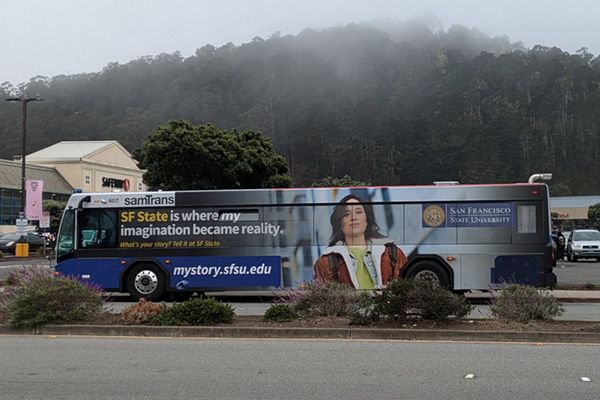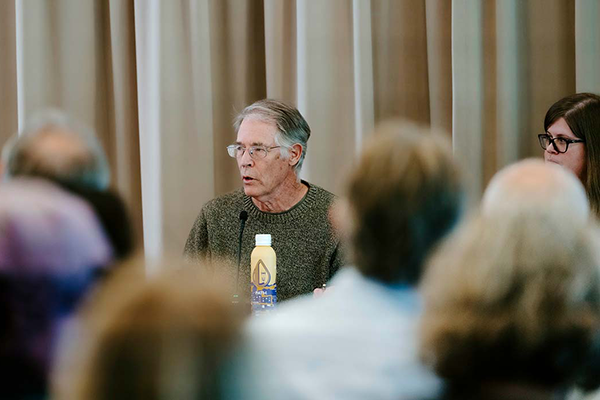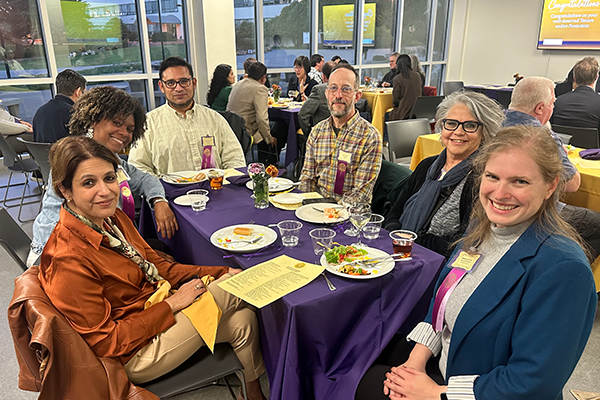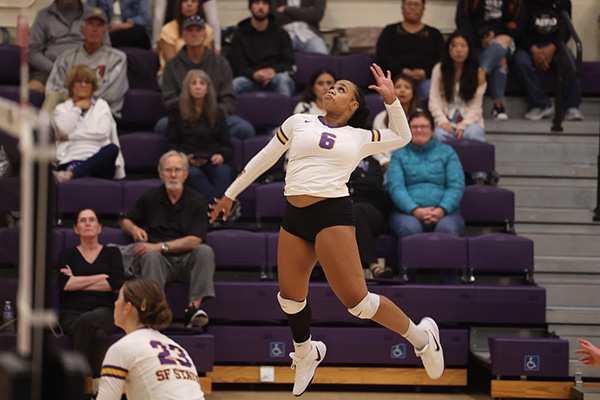News and Announcements

In the market since 2022 and developed by the Office of Strategic Marketing and Communications, “My Story” is the first-ever SFSU brand awareness and enrollment marketing campaign to be featured in the University’s target markets. “My Story” has appeared on social media, television, billboards, radio and buses. The campaign tells the stories of students and alumni and asks prospective students to discover their own story at SF State.
Analytics show that when the “My Story” campaign is in the market, traffic users to the SFSU website (the primary source of information for prospective students and families increase by 160%.
Now it’s time to refresh the campaign — Watch for new SFSU marketing by summer. Strategic Marketing and Communications will show ideas of the new concepts at the Human Resources leadership and staff forums this month.
Photo by Matt Itelson

Members of the SF State community packed the Seven Hills Conference Center Monday, Nov. 4, to hear climate thought leader and bestselling author Kim Stanley Robinson talk about climate change solutions, hope and storytelling. The free event, titled “Visioning Climate Change Solutions: The Power of Hope Through Storytelling,” was sponsored by the San Francisco State Foundation and Climate HQ, the University collaborative dedicated to nurturing tomorrow’s climate justice leaders.
“I think it’s important to remember hope is a team sport. You need to share it and then they will lift you,” Robinson told nearly 200 students, faculty, alumni and staff members in attendance. He first heard the idea from Hungarian economist Annette Mikes, who started the Oxford Ministry for the Future, named after Robinson’s book.
Robinson was joined by a faculty panel of climate, policy and fiction experts: Professor of Management and Social Innovation Geoff Desa, Assistant Professor of Physics and Astronomy Charli Sakari, Professor of Race and Resistance Studies Gopal Dayaneni and Professor of Creative Writing Andrew Joron. Before the panel discussion, a group of 12 Creative Writing students also had a brownbag session with Robinson to talk about the writing process.
In addition to being a bestselling author, Robinson’s numerous accolades include being Time magazine’s “Hero of the Environment.” On the topic of climate solutions, he’s collaborated with leaders across various sectors, including scientists and the United Nations. His 2020 novel “The Ministry for the Future” was one of President Barack Obama’s favorite books of 2020 and one of Bill Gates’ summer books in 2022.
“I wanted to tell a story of things going well without a master plan, with everybody throwing their weight into their part of the project,” he said of the novel. “It’s a science fiction story. We have to make it come true or else it’s just a fantasy that I told to kind of comfort us as we fall into chaos. But what I’ve found is that in the four years since the book came out is that people are hungry for that story.”
Other topics included climate justice, trusting science, advice for budding journalists and scientists, how students can minimize the effects of climate change and how to teach storytelling as activism to grade-school students.
“What I deeply appreciate about this conversation is grappling with the moral implications of both action and inaction and who gets to speak, whose voices are heard,” said Desa, who served as panel moderator.
Learn more about Climate HQ events and get involved in climate solutions.
Photo by Juan Montes

Academic Affairs honored faculty members who were granted tenure and/or received a promotion this academic year. The celebration was held Nov. 6 in Library 121.
Please view the PDF file for a full list of the 2024 – 2025 honorees. The Office of the Provost and Academic Affairs congratulates all of the tenured and/or promoted faculty.
Photo courtesy of Academic Affairs
The National Institutes of Health (NIH) and National Science Foundation (NSF) has awarded over $1.5 million in grants to support SFSU research efforts aimed at humanizing scientists in undergraduate science courses. Professor of Biology Kimberly Tanner will lead the efforts over the next five years in collaboration with researchers at SFSU’s Science Education Partnership and Assessment Laboratory.
The projects aim to engage undergraduate students across multiple science disciplines in The Scientist Spotlights Initiative, in which students learn about science through personal stories and professional work of counter-stereotypical scientists. Jeffrey Schinske, an SFSU alum and community college professor, invented Scientist Spotlights.
These research efforts will be done with colleagues at Foothill College, University of Georgia and University of San Francisco to reveal how humanizing science curriculum may impact students’ interests, attitudes, and success in science. The NIH project will allow undergraduate students to work alongside high school students as near peer mentors to interview scientists from diverse backgrounds and co-author new Scientist Spotlights. The NSF project will expand student-authored Scientist Spotlights in disciplines beyond the life sciences, specifically in undergraduate Chemistry. Both grant awards will contribute to expanding SEPAL’s online, open-access database, where students in high school and college courses around the world can experience Scientist Spotlight assignments and reflect on the types of people who can do science.
The Institute for Civic and Community Engagement has named its Civic and Community Engagement faculty ambassadors: Associate Professor of Environmental Studies Aritree Samanta and Professor of Recreation, Parks and Tourism Pavlína Látková. They have extensive backgrounds and expertise in community-engaged learning, teaching.
Per Academic Senate Policy F19-177, the Educational Policies Committee must inform the campus community of the following discontinuance proposal two weeks before Senate action. Discontinuance has been proposed for the Certificate in Youth and Human Services Nonprofit Administration and will be reviewed in November and December.
To file a response, please email Claude Bartholomew.
The CSU requires campuses to implement a driver safety program and driver authorization process (including defensive driver training) for all employees. SF State’s Driver Safety Program is designed to establish guidelines to ensure that University employees driving state-owned (including rentals, leased vehicles, power carts and 10-plus passenger vans) or privately-owned vehicles, for University business purposes, are informed of SF State’s expectations for employees driving on University business and are provided with comprehensive defensive driver training to help reduce vehicle accidents.
Employees wishing to drive on University business must complete SF State’s driver authorization process prior to approval. Employees must submit Driver Safety Program forms, including the Employer Pull Notice Authorization form and successfully complete an online Defensive Driver Training module. The course covers general defensive driving techniques for avoiding collisions, driving safely in various weather conditions, and responding to driving emergency situations.
SF State has recently revised the training requirements needed to be an authorized driver. A supplemental Driver Safety Program Guide training module has been developed and will supplement the existing CSULearn Defensive Driver Training module. The supplemental training module is now required of both existing authorized drivers and employees with new requests for authorization to drive. The supplemental Driver Safety Program Guide training module will provide additional information about driving on SF State business including policy guidance, vehicle accident reporting and car rental program compliance.
The driver authorization process is required to be completed only once for employees in good standing. (Please note: Authorization to use a personal vehicle for University business must be renewed annually.) Any employee who has had their driving privileges suspended must be reauthorized to drive.
On Monday, Dec. 2, employees authorized to drive on University business will be emailed a DocuSign PowerForm link, which will access the Driver Safety Program Guide training module. Please complete the training by Tuesday, Dec. 31.
Effective Dec. 2, employees submitting a new request to drive on University business will be provided with the supplemental training as part of their authorization process.
For questions, please email Demond Blanton.
Do you have an interest in incorporating climate change and/or climate justice into your pedagogy? Through SF State’s Climate Justice Leaders Initiative, Climate HQ aims to strengthen climate justice teaching, research and outreach at SF State.
Climate HQ supports climate justice teaching at SF State through Climate Justice Faculty Learning Communities. Modeled on Center for Equity and Excellence in Teaching and Learning’s Teaching Squares, these communities will meet regularly throughout the semester to support each other and share best practices for teaching and learning focused on climate justice pedagogies.
The Climate HQ Faculty Learning Communities will take place spring 2025. Each should consist of three to six faculty, staff or students. Both interdisciplinary groups and people within departments/disciplines are encouraged to apply.
The communities should meet to work on their project for 10 hours over the course of the semester, using curated resources to create a proposed pedagogy outcome including but not limited to: syllabus change, readings list, assignment/exercise, lecture(s), project-based collaboration between departments, community collaboration and/or organization of a Climate HQ event for campus.
A $500 honorarium is provided. Please apply by Wednesday, Nov. 20, at 5 p.m. View the call for proposals.
For questions, please email Carolina Prado.
The SF State Academic Senate will meet Tuesday, Nov. 12, 2 – 5 p.m., via Zoom for its sixth meeting of the academic year.
- Recommendation from the Executive Committee as a consent items:
- Summer 2025 academic calendar
- Fall 2025 and spring 2026 academic calendar
- Recommendation from the Campus Curriculum Committee proposals for substantive decrease in units as a consent item:
- B.A. in Broadcast and Electronic Communications Arts
- Recommendation from the Campus Curriculum Committee in first reading:
- Multilingual and International Tourism Competencies: new certificate
- Multilingual and International Business Competencies: new certificate
- Master of Arts in Cinema and Media Studies: name change
- Recommendation from Educational Policies Council in first reading:
- Graduation Requirements for Baccalaureate Students which supersedes Requirements for Baccalaureate Degrees, Majors, Concentrations, Minors and Certificates #S24-255 and Undergraduate Certificate Requirements #S87-88
- Recommendation from Academic Policies Committee in first reading:
- Revision to Academic Calendar Policy #S21-242
- Recommendation from Academic Policies Committee in second reading:
- Revision to Grade Appeal Policy #S19-230
- Recommendation from Student Affairs Committee items in second reading:
- Resolution in Support of Affirmed Names
- Resolution in Support of Affirmed Pronouns
- Recommendation from Faculty Affairs Committee items in second reading:
- Assigned Time for Temporary Faculty Unit Employees Performing Institutional Service
- Academic Senate will hear a formal presentation from:
- Katie Lynch, senior associate vice president for Enrollment Management; Sutee Sujitparapitaya, associate provost for Institutional Analytics; and Lori Beth Way, vice provost of Academic Planning and dean of Undergraduate Education: “Enrollment Update and Projections” (time approximate 2:40 – 3 p.m.).
SF State partners with other CSU campuses to provide workshops to employees. The CSU Cross-Campus Collaboration extends workshops beyond campus borders, creating an alternative way to share professional development across the CSU.
Workshops include:
- “Servant Leadership: Lessons from Ted Lasso”
- “Breath and Health”
- “Working With Difficult People”
- “Outsmarting Impostor Syndrome”
- “Crafting Accessible Word Documents”
- “Building Bridges for Authentic Communication with Psychological Safety”
- “Decisions, Decisions! Creative Problem Solving and Decision-Making Techniques”
- “Overcoming Procrastination” (offered by SF State)
- “Planning a Successful Event” (offered by SF State)
- “Bridges Transition Model: The Human Side of Change”
- “Transforming Grief into Growth”
- “Sustainable Living: Holiday Edition”
- “Being a Champion: Strategies for Getting Ahead”
- “Lemons to Lemonade: Using Appreciative Inquiry to Drive Change for Higher Ed Professionals”
- “The Performance Diagnostic Checklist: A simple tool to boost your team’s success”
To sign up for a workshop, please visit the Live Learning Programs page.
Faculty members in the International Relations department will lead “The Year of 64 Ballots: U.S. Elections in Global Perspective” on Tuesday, Nov. 12, 12:30 – 1:30 p.m., in Science and Engineering Innovation Center 210 and via Zoom. They will discuss the results of the U.S. presidential race within the context of 64 national elections that concluded in 2024. Is the U.S. an exception? Did the U.S. elections bring as many surprises as in France, Britain, Venezuela and other countries? How did misinformation, artificial intelligence, the rise of populism, corruption and anti-immigrant sentiments influence global elections?
The Lam-Larsen Initiative Centers at SF State will host the workshop/webinar “Navigating Difficult Conversations: Teaching Feedback Skills with AI Tools” at noon on Tuesday, Nov. 12. Yikuan Lee and Chenwei Li will share their experiences integrating Large Language Models and chatbots into their “Management Leadership” (MGMT 648) and “International Business Entrepreneurship” (IBUS 590) courses. An earlier version of this workshop was presented at the Management and Organizational Behavior Teaching Society in the summer.
Lee is an associate professor of International Business. Her research covers new product innovation, innovation adoption, strategic marketing management in high-tech arenas, decision-making, psychology and behavioral economics. Her work has appeared in prestigious journals.
Li is an associate professor of Management. Her research focuses on leadership, employee voice and team creativity. Her work has been published in premier management journals such as the Journal of Management, Journal of Organizational Behavior and Journal of Business Ethics.
The meeting is open to all faculty. Registration is not required. Please join via Zoom (meeting ID: 854 0549 9126; Passcode: 167205).
Please join the Comic Studies Program on Wednesday, Nov. 13, at 4:15 p.m. in Humanities 587 and via Zoom for a conversation with Belgian conceptual comics artist Ilan Manouach.
Manouach is a leading innovator for outside-the-box comics. From provocative reworkings of beloved classics to his recent work developing synthetic artificial intelligence (AI) comics, Manouach’s thought-producing pieces push us to think about comics in new ways. Manouach will share about one of his past innovations, “Shapereader,” a tactile comic that uses tactile ideograms to invent new means of textual storytelling. The discussion of “Shapereader” will set the stage to better understand conceptual comics and their potential.
Please register via Zoom to attend virtually. For access questions, please email Emily Beitiks at beitiks@sfsu.edu.
The campus community is invited drop in to the Holistic Health Lecture Series events on mindful movement meditation on Wednesday, Nov. 13, and Wednesday, Nov. 20, noon – 1 p.m., in HSS 306. Sonja Riket, a master somatic movement therapist and educator, will lead the lecture. Riket has been a guest lecturer in the Institute for Holistic Health Studies for 18 years.
Everyone has a great capacity for learning and changing habits that lead to tension, stress, anxiety and pain. Diminish your discomforts, improve your balance, coordination, focus and increase awareness of self while being guided through slow and gentle movements. Experience periods of stillness by accompanying your breath to allow a deep dive in a meditative state. Reconnect with the wisdom of your body while recovering from injury, illness or trauma and come home to yourself.
The lecture series is sponsored by the Institute for Holistic Health Studies, in the Department of Recreation, Parks and Tourism.
Please email Professor Richard Harvey at rharvey@sfsu.edu for more information.
Ready to take your artificial intelligence (AI) skills to the next level? Academic Technology hosts “Going Further with Generative AI,” a workshop on Thursday, Nov. 14, 10:30 a.m. – noon, designed for faculty and staff comfortable with AI chatbot basics.
Learn advanced prompting techniques, explore powerful chatbot features and practice applying them to real-world challenges like streamlining communication, improving project management or automating routine tasks. Through hands-on activities and collaboration, gain practical skills and a toolkit of advanced AI prompts that can save time and empower you to do your best work.

Please join in supporting the nationally ranked SF State women’s volleyball team as they make a push for the postseason! The Gators are ranked No. 19 in the nation in NCAA Division II. SF State hosts Cal State San Marcos on Thursday, Nov. 14, at 5 p.m., in the Main Gymnasium. Admission is free for SF State students, faculty, and staff.
The All University Committee on International Programs (AUCIP) and the Division of International Education present an international coffee hour on Thursday, Nov. 14, noon – 1 p.m., in the Teaching and Learning Commons (Library 286). The event aims to connect international and internationally minded faculty, administrators and staff about international programs and global issues.
This event occurs twice each semester. AUCIP organizes the event. AUCIP is an Academic Senate committee. The Division of International Education will provide refreshments.
Celebrate SF State students who will study abroad in spring 2025! Faculty and staff are invited to the Division of International Education’s ceremony on Friday, Nov. 15, 3:30 – 5 p.m., in the Student Life Event Center (Annex 1).
This is the final sendoff for students participating in the CSU International Program or an SF State Exchange Program.

Please join the Museum Studies Program for its student-developed exhibit “Craft or Commodity?”, highlighting human ingenuity and reflecting on Indigenous and colonial influences on craftspersonship. The opening reception is on Saturday, Nov. 16, 1 p.m. – 3 p.m., in the Global Museum gallery, Fine Arts 203. The exhibition will then be on view through May on Tuesdays, Wednesdays and Thursdays, 11 a.m. – 4 p.m. (closed for campus recesses).
“Craft or Commodity?” features a selection of items from the SF State collections, originally acquired in the mid-20th century by faculty researchers studying international arts adapted to be sold in tourist markets. Student curators researched and interpreted the objects to honor their makers and their legacies of craftspersonship.
Also highlighted are the clues the objects reveal about the impact of colonial histories on their makers. People from all over the world have crafted objects for trade, self-expression, storytelling, spiritual practices and countless other uses, utilizing techniques passed down from generation to generation. Many of the objects stewarded by the Global Museum and Museum Studies Program on behalf of SFSU fall under this category, collected by researchers for study or acquired as souvenirs.
Each object featured in the exhibition represents the connections between culture, material, and colonial influences that have impacted the people who made them. What happens to an object when it is taken from its source community? How has colonialist intervention impacted the sacred process that is making? Are these objects examples of skilled craftsmanship, or the result of the capitalization of culture?
The Center for Equity and Excellence in Teaching and Learning (CEETL) invites the campus community to a workshop series for instructors teaching Writing and Reading Across the Curriculum (WRAC) courses. Graduate Writing Assessment Requirement instructors are encouraged to attend.
The theme of this series is “Pedagogies from the Global South”; this workshop will focus on assessing writing within this framework. It takes place Monday, Nov. 18, 1 – 3 p.m., in Library 286.
Please register via Qualtrics. Select “Writing & Reading Across the Curriculum Workshop Series,” and when prompted in the form, select “Nov. 18th @1-3. Assessing Writing. LIB 268.”
Participants who attend all three workshops in the WRAC series will receive a badge.
Do artificial intelligence (AI) tools promote bias? Are they exploitative? Environmentally harmful? Please join the Center for Equity and Excellence in Teaching and Learning (CEETL) on Tuesday, Nov. 19, noon – 1:30, via Zoom for an interactive workshop to answer these questions and learn about the field of critical AI. Participants will wrestle with the ethical, social and cultural implications of new technologies, and to discuss best practices in developing students’ critical AI literacy.
Please register via Qualtrics. This event is as listed as both an AI workshop and a Justice, Equity Diversity and Inclusion (JEDI) workshop, as it integrates the themes of both series. Register by choosing either “AI Workshop Series” or “JEDI Workshop Series” and, when prompted in the survey, select “November 19th @ 12-1:30. Critical AI in the Classroom. Online.”
Participants who attend all three workshops in the AI and/or JEDI series will receive a badge. Please visit CEETL’s Courses and Programs page for other workshops in this series.
Staff members are invited to the Office of Human Resources’ next Staff Forum on Wednesday, Nov. 20, 10 – 11 a.m., via Zoom. The agenda includes presentations from the Office Strategic Marketing and Communications on an SF State website redesign and marketing strategies.
All campus staff, except Management Personnel Plan (MPP) and faculty, are encouraged to attend.
Please join the American Indian Studies (AIS) Department on Wednesday, Nov. 20, for a day of events — in person and online — commemorating the 55th anniversary of the occupation of Alcatraz. Events take place in Ethnic Studies and Psychology 116.
Schedule:
- 11 a.m. – 12:15 p.m., “Native California and the Alcatraz Occupation”: Gregg Castro (Ramaytush Ohlone) addresses the experiences and concerns of Native Californians at the occupation and in ongoing conversations about its significance and legacy.
- 12:30 – 1:45 p.m., “SFSU Archives of the Alcatraz Occupation”: Rob Collins, associate professor of American Indian Studies, will lead a discussion with librarians and others about SFSU video and print archives of the occupation.
- 7 – 8:30 p.m., “The Concert: In Gratitude to the Community of AIS”: This fundraising event supports AIS faculty and student research features a special performance by Paul Steward (Elem Pomo) of Twice As Good.
Registration is required for all events, whether attending in person or via Zoom. Please visit the College of Ethnic Studies website for details and to register.
For questions, please email American Indian Studies at aismain@sfsu.edu.
The Nathan Shapira Design Archive in the School of Design will reopen in a new location. Please join the School of Design to celebrate the reopening and the 13th anniversary of the archive on Wednesday, Nov. 20, 11:30 a.m. – 1:30 p.m., at its new location, Humanities 112.
Virtual participants will need to register for the Zoom link in advance.
Schedule:
- 11:30 a.m. – noon: Opening reception with drinks and refreshments
- Noon – 12:30 p.m.: Welcome/introduction to invited Shapira Archive alums, colleagues and associates
- 12:30 – 1 p.m.: Recognition of retired Design faculty, memorial tribute to James Edwards and Cece Iandoli, and Epsilon Pi Tau laureate and distinguished members
- 1-1:30 p.m.: Closing reception
The University Budget Committee (UBC) invites employees to its next meeting of the academic year on Thursday, Nov. 21, 10 a.m. – noon, via Zoom.
UBC Members represent you: staff, faculty, students, administrators. UBC members host “office hours” the day after the meeting to answer questions and share feedback about University budget-related matters.
Please RSVP for the meeting and/or office hours by emailing the UBC at ubc@sfsu.edu.
The campus community is invited to a free screening of “The Dawn Is Too Far: Stories of Iranian American Life” on Thursday, Nov. 21, at 4:30 p.m. in August Coppola Theatre, Fine Arts building. A Q&A will follow the screening.
The documentary shares the powerful narratives of individuals from the Bay Area Iranian diaspora community, who contribute to and creatively respond to their history, and indeed add to the richness of this region.
Co-Directors Persis Karim and Soumyaa Behrens (both of SF State) have sought to tell another story of the Iranian-American experience, amplifying not only how the Bay Area has shaped these individuals and their journeys as Iranian Americans, but also the ways that they have given back to the culture and community of San Francisco and the East Bay. The eight individuals in “The Dawn is Too Far” narrate their stories of arrival and resilience, as well as experiences of loss and alienation in the context of major historical events such as the 1979 Iranian revolution, the hostage crisis, 9/11 and most recently, the Trump Muslim ban. By foregrounding their lives within the longer arc of Iran-U.S. history over six decades, this documentary film highlights their participation in social and cultural movements, but also reveals the ways that they have grounded their lives in the U.S.
This event is co-sponsored by the Center for Iranian Diaspora Studies, Race and Resistance Studies Department, School of Cinema, Marcus Endowed Chair in Social Justice Film and Humanities and Comparative and World Literature Department.
SF State Spotlight
The SF State Mobile App has won an award for Best App Redesign at the 2024 Appademy Awards, presented by Modo. The app also received nominations for Best Personalized Experience and Best Use of Communications. More than 100 submissions were submitted from universities nationwide.
Now in its seventh year, the Appademy Awards recognizes the innovativeness and creativity of campuses using the Modo Campus platform to meet the needs of their students with a mobile app and/or web portal.
Design Professor Ricardo Gomes will be a guest on the “At Home, On Air” podcast on Thursday, Nov. 14. “At Home, On Air” is a production of At Home With Growing Older, a Berkeley nonprofit that brings together professionals, academics and others to re-envision and improve the experiences of later life.
Marc Stein, the Jamie and Phyllis Pasker Professor of History, was quoted in two stories in LGBTQ Nation last week.
He is quoted extensively on Nov. 2 in an article about the potential for an out LGBTQ+ Supreme Court justice. In a Nov. 4 story, he gives his perspectives on implications for the LGBTQ community for Donald Trump’s presidential election.
“In some respects, LGBTQ people in the United States before the 1970s lived in a police state, vulnerable to state power, legal and extralegal policing, and denied basic rights,” Stein said. “That doesn’t mean that we lived under fascism, but it provides some clues about what LGBTQ people might justifiably fear about living under a fascist president.”